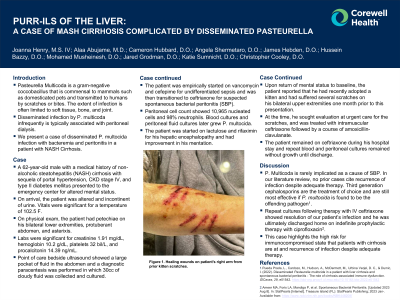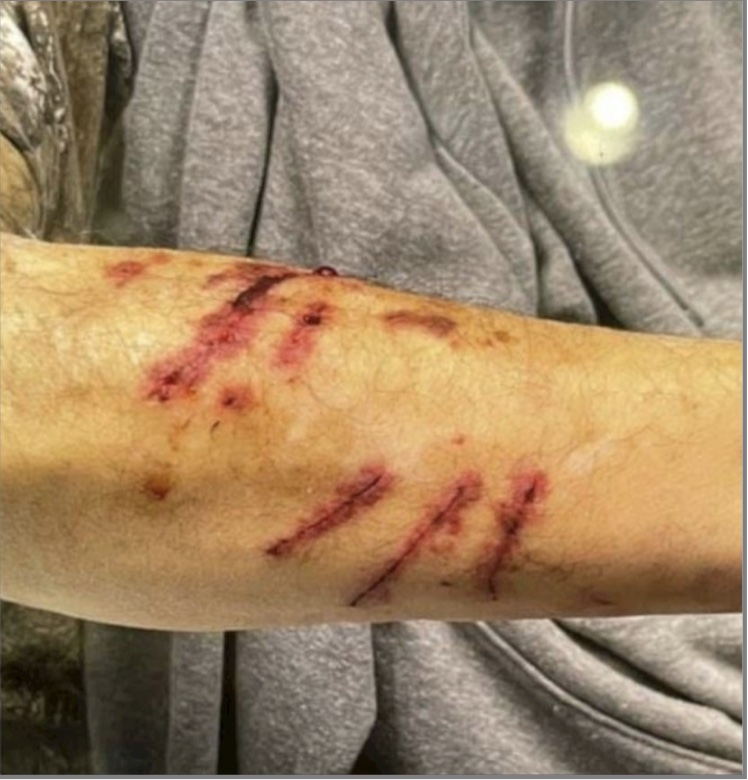Tuesday Poster Session
Category: Liver
P4786 - Purr-ils Of The Liver: A Case of Disseminated Pasteurella In A Patient With MASH Cirrhosis
Tuesday, October 29, 2024
10:30 AM - 4:00 PM ET
Location: Exhibit Hall E

Has Audio
- MM
Mohamed Musheinesh, DO
Beaumont Hospital
Farmington Hills, MI
Presenting Author(s)
Joanna Henry, DO1, Alaa Abujame, MD2, Angela Shermetaro, DO2, James Hebden, DO2, Hussein Bazzy, DO2, Mohamed Musheinesh, DO3, Jared Grodman, DO2, Katie Sumnicht, DO2, Christopher Cooley, DO2
1Michigan State University College of Osteopathic Medicine, Farmington Hills, MI; 2Corewell Health, Farmington Hills, MI; 3Beaumont Hospital, Farmington Hills, MI
Introduction: Pasteurella Multocida is a gram-negative coccobacillus that is transmitted to humans by other mammals, often domesticated pets. Disseminated infection by P. multocida, including peritonitis, is typically associated with peritoneal dialysis. We present a case of disseminated P. multocida infection with bacteremia and peritonitis in a patient with Metabolic Associated Steatohepatitis (MASH) Cirrhosis.
Case Description/Methods: A 62-year-old male with a medical history of MASH cirrhosis with sequela of portal hypertension presented to the emergency center for altered mental status. Vitals were significant for a temperature of 102.5 F, RR 24. On physical exam, the patient had petechiae on his bilateral lower extremities, distended abdomen, and asterixis. Labs were significant for creatinine 1.91 mg/dL, hemoglobin 10.2 g/dL, platelets 32 bil/L, and procalcitonin 14.39 ng/mL. Diagnostic paracentesis was performed, which yielded 30cc of cloudy, red-yellow fluid, which was cultured. The patient was empirically started on vancomycin and cefepime before being transitioned to ceftriaxone for suspected spontaneous bacterial peritonitis (SBP). Peritoneal cell count showed 10,965 nucleated cells and 98% neutrophils. Blood cultures and peritoneal fluid cultures later grew P. multocida. The patient was started on lactulose and rifaximin for his hepatic encephalopathy. Upon resolution of altered mentation, the patient reported that he had recently adopted a kitten and had suffered several scratches on his bilateral upper extremities one month prior to this presentation. He had sought evaluation at urgent care then and was treated with intramuscular ceftriaxone followed by a course of amoxicillin-clavulanate and was subsequently asymptomatic until this hospital presentation. The patient remained on ceftriaxone during his hospital stay and repeat blood and peritoneal cultures remained without growth until discharge.
Discussion: In our review of the literature, P. multocida is rarely implicated as a cause of SBP in the absence of peritoneal dialysis, which was the case of our patient. Repeat cultures following therapy with IV ceftriaxone showed resolution of our patient’s infection and he was discharged home on indefinite prophylactic therapy with ciprofloxacin. This case highlights a rare occurrence of disseminated P. multocida in the absence of peritoneal dialysis despite sufficient initial antimicrobial therapy, emphasizing the immunologic frailty of this patient population.

Disclosures:
Joanna Henry, DO1, Alaa Abujame, MD2, Angela Shermetaro, DO2, James Hebden, DO2, Hussein Bazzy, DO2, Mohamed Musheinesh, DO3, Jared Grodman, DO2, Katie Sumnicht, DO2, Christopher Cooley, DO2. P4786 - Purr-ils Of The Liver: A Case of Disseminated Pasteurella In A Patient With MASH Cirrhosis, ACG 2024 Annual Scientific Meeting Abstracts. Philadelphia, PA: American College of Gastroenterology.
1Michigan State University College of Osteopathic Medicine, Farmington Hills, MI; 2Corewell Health, Farmington Hills, MI; 3Beaumont Hospital, Farmington Hills, MI
Introduction: Pasteurella Multocida is a gram-negative coccobacillus that is transmitted to humans by other mammals, often domesticated pets. Disseminated infection by P. multocida, including peritonitis, is typically associated with peritoneal dialysis. We present a case of disseminated P. multocida infection with bacteremia and peritonitis in a patient with Metabolic Associated Steatohepatitis (MASH) Cirrhosis.
Case Description/Methods: A 62-year-old male with a medical history of MASH cirrhosis with sequela of portal hypertension presented to the emergency center for altered mental status. Vitals were significant for a temperature of 102.5 F, RR 24. On physical exam, the patient had petechiae on his bilateral lower extremities, distended abdomen, and asterixis. Labs were significant for creatinine 1.91 mg/dL, hemoglobin 10.2 g/dL, platelets 32 bil/L, and procalcitonin 14.39 ng/mL. Diagnostic paracentesis was performed, which yielded 30cc of cloudy, red-yellow fluid, which was cultured. The patient was empirically started on vancomycin and cefepime before being transitioned to ceftriaxone for suspected spontaneous bacterial peritonitis (SBP). Peritoneal cell count showed 10,965 nucleated cells and 98% neutrophils. Blood cultures and peritoneal fluid cultures later grew P. multocida. The patient was started on lactulose and rifaximin for his hepatic encephalopathy. Upon resolution of altered mentation, the patient reported that he had recently adopted a kitten and had suffered several scratches on his bilateral upper extremities one month prior to this presentation. He had sought evaluation at urgent care then and was treated with intramuscular ceftriaxone followed by a course of amoxicillin-clavulanate and was subsequently asymptomatic until this hospital presentation. The patient remained on ceftriaxone during his hospital stay and repeat blood and peritoneal cultures remained without growth until discharge.
Discussion: In our review of the literature, P. multocida is rarely implicated as a cause of SBP in the absence of peritoneal dialysis, which was the case of our patient. Repeat cultures following therapy with IV ceftriaxone showed resolution of our patient’s infection and he was discharged home on indefinite prophylactic therapy with ciprofloxacin. This case highlights a rare occurrence of disseminated P. multocida in the absence of peritoneal dialysis despite sufficient initial antimicrobial therapy, emphasizing the immunologic frailty of this patient population.

Figure: Figure 1. Healing wounds on patient's right arm from prior kitten scratches (images taken one month prior to hospital admission).
Disclosures:
Joanna Henry indicated no relevant financial relationships.
Alaa Abujame indicated no relevant financial relationships.
Angela Shermetaro indicated no relevant financial relationships.
James Hebden indicated no relevant financial relationships.
Hussein Bazzy indicated no relevant financial relationships.
Mohamed Musheinesh indicated no relevant financial relationships.
Jared Grodman indicated no relevant financial relationships.
Katie Sumnicht indicated no relevant financial relationships.
Christopher Cooley indicated no relevant financial relationships.
Joanna Henry, DO1, Alaa Abujame, MD2, Angela Shermetaro, DO2, James Hebden, DO2, Hussein Bazzy, DO2, Mohamed Musheinesh, DO3, Jared Grodman, DO2, Katie Sumnicht, DO2, Christopher Cooley, DO2. P4786 - Purr-ils Of The Liver: A Case of Disseminated Pasteurella In A Patient With MASH Cirrhosis, ACG 2024 Annual Scientific Meeting Abstracts. Philadelphia, PA: American College of Gastroenterology.
